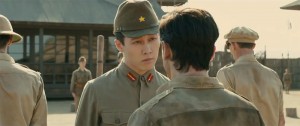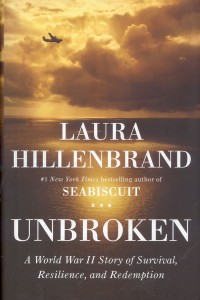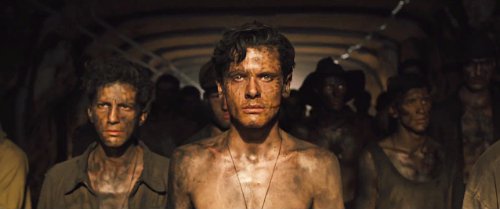Angelina Jolie’s Unbroken: Read the book first
Director Angelina Jolie’s Unbroken takes Italian-American World War II hero Louis Zamperini’s life from the pages of Laura Hillenbrand’s best-selling novel to the big screen, but too many chapters were omitted.
Jolie’s biggest problem isn’t what she showed the audience – it’s what she didn’t, turning what could have been a great movie merely a good one, leaving audiences wanting more after the screen fades to black.
Zamperini’s life was made for the big screen. He overcame a misfit youth to become a track star who competed in the 1936 Berlin Olympics to an Army Corps bombardier engaging in combat missions in the South Pacific.

But in 1943, the rickety B-24 aircraft carrying Zamerpini, played by Jack O’Connell, and his crew crashed into the water. He and two other survivors, “Phil” Phillips and “Mac” McNamara, survived 33 days on a life raft, contending with Japanese bomber attacks and killer sharks. McNamara died the next day, but Zamperini and Phillips floated in the Pacific Ocean until they were “rescued” by the Japanese Navy at gunpoint on day No. 47.
Zamperini, identified early on as an Olympian by his captors, spent the rest of the war in prisoner of war camps where his torture increased with each passing day, from being beaten with a stick, to being forced to use his face as a punching bag for fellow POWs.
O’Connell’s performance commands the audience’s attention throughout the 137-minute film. The unyielding loyalty he shows for his country as he’s being pushed to the brink of death is inspiring.
“If I can take it, I can make it,” he says as the Japanese do their best to break his will.
He lost 25 pounds during shooting, going from a physically fit airman shooting down planes throughout the movie’s fantastic aerial dogfight to an emaciated prisoner by war’s end.

The dynamic relationship between Zamperini and head prison guard Mutsuhiro Watanabe (musician Miyavi) carries the second half of the movie, as Watanabe’s goal to break Zamperini’s unrelenting will reaches an emotional climax, evoking the religious imagery of crucifixion that shows the triumph of the American spirit.
What Zamperini, who died this past July at age 97, endured during World War II is portrayed brilliantly yet the movie basically ends when he embraces his family upon his return home to Torrance, Calif, in 1945.
But Zamerpini’s life didn’t end that day on the airfield, meaning most of his life, including how it was forever changed during World War II isn’t flushed out.
 Unbroken is supposed to be a biopic on Zamperini, but really, it focuses on his life between his preteen years – when he’s a punk kid stealing cigarettes and alcohol – until his return home in 1945 at age 28. The movie basically ignores Zamperini’s last 60 years of life.
Unbroken is supposed to be a biopic on Zamperini, but really, it focuses on his life between his preteen years – when he’s a punk kid stealing cigarettes and alcohol – until his return home in 1945 at age 28. The movie basically ignores Zamperini’s last 60 years of life.
That’s too bad, as his mental and physical pain he endured during the war shaped the rest of his life, which could have made for some fantastic scenes.
Zamperini, while floating on a life raft reciting his mother’s Italian recipes, says he’ll dedicate his life to God if he’s saved. Exactly what did he do to become a more devout Christian when he made it home? And what about his battle with post-traumatic stress disorder? You better read the book because those answers aren’t in the movie.
Since so much of the movie deals with the sadistic torment Zamperini suffered at the hands of his Japanese captors, it comes as quite a letdown when Jolie lets the audience know – in writing not acting – that Zamperini returned to Japan to meet with his captors.
Well, uh, what did Zamperini say to them? What did they say to Zamperini, a man whose life mattered so little?
These scenes could have transcended Unbroken could have been transcended by these scenes, which will be the difference between winning an Oscar and just being nominated.

Jon Gallo is an award-winning journalist and editor with 19 years of experience, including stints as a staff writer at The Washington Post and sports editor at The Baltimore Examiner. He also believes the government should declare federal holidays in honor of the following: the Round of 64 of the NCAA men’s basketball tournament; the Friday of the Sweet 16; the Monday after the Super Bowl; and of course, the day after the release of the latest Madden NFL video game.

